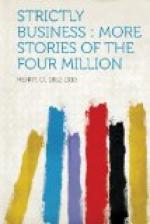The foundation of his fortune was made when he was twenty. A poor coal-digger (ever hear of a rich one?) had saved a dollar or two and bought a small tract of land on a hillside on which he tried to raise corn. Not a nubbin. Jacob, whose nose was a divining-rod, told him there was a vein of coal beneath. He bought the land from the miner for $125 and sold it a month afterward for $10,000. Luckily the miner had enough left of his sale money to drink himself into a black coat opening in the back, as soon as he heard the news.
And so, for forty years afterward, we find Jacob illuminated with the sudden thought that if he could make restitution of this sum of money to the heirs or assigns of the unlucky miner, respite and Nepenthe might be his.
And now must come swift action, for we have here some four thousand words and not a tear shed and never a pistol, joke, safe, nor bottle cracked.
Old Jacob hired a dozen private detectives to find the heirs, if any existed, of the old miner, Hugh McLeod.
Get the point? Of course I know as well as you do that Thomas is going to be the heir. I might have concealed the name; but why always hold back your mystery till the end? I say, let it come near the middle so people can stop reading there if they want to.
After the detectives had trailed false clues about three thousand dollars—I mean miles—they cornered Thomas at the grocery and got his confession that Hugh McLeod had been his grandfather, and that there were no other heirs. They arranged a meeting for him and old Jacob one morning in one of their offices.
Jacob liked the young man very much. He liked the way he looked straight at him when he talked, and the way he threw his bicycle cap over the top of a rose-colored vase on the centre-table.
There was a slight flaw in Jacob’s system of restitution. He did not consider that the act, to be perfect, should include confession. So he represented himself to be the agent of the purchaser of the land who had sent him to refund the sale price for the ease of his conscience.
“Well, sir,” said Thomas, “this sounds to me like an illustrated post-card from South Boston with ‘We’re having a good time here’ written on it. I don’t know the game. Is this ten thousand dollars money, or do I have to save so many coupons to get it?”
Old Jacob counted out to him twenty five-hundred-dollar bills.
That was better, he thought, than a check. Thomas put them thoughtfully into his pocket.
“Grandfather’s best thanks,” he said, “to the party who sends it.”
Jacob talked on, asking him about his work, how he spent his leisure time, and what his ambitions were. The more he saw and heard of Thomas, the better he liked him. He had not met many young men in Bagdad so frank and wholesome.
“I would like to have you visit my house,” he said. “I might help you in investing or laying out your money. I am a very wealthy man. I have a daughter about grown, and I would like for you to know her. There are not many young men I would care to have call on her.”




